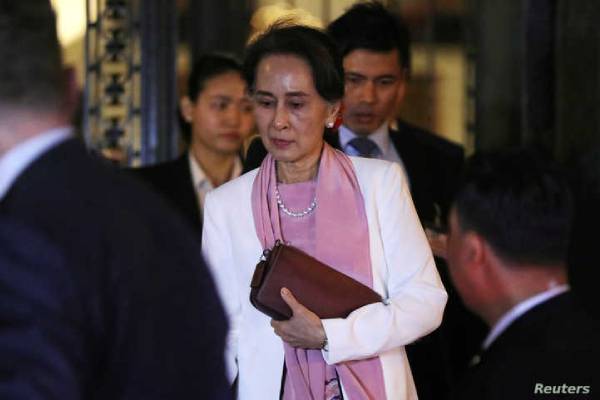LONDON — As Myanmar's State Counsellor Aung San Suu Kyi addressed the International Court of Justice in The Hague this week, many former supporters watched in dismay as the Nobel peace laureate denied accusations that Myanmar's military conducted atrocities against the Rohingya Muslim population.
Prosecution lawyers say the military's actions amount to genocide, and many of Aung San Suu Kyi's critics say she bears some responsibility for the continued persecution of the Muslim minority, three-quarters of a million of whom have fled the country.
Human rights groups highlight the continuing detention of Rohingya people across Myanmar on charges of "traveling illegally" in the country.
The "Rohingya are not granted freedom of movement," said John Quinley III of the campaign group Fortify Rights. "We've documented recently forced labor of (the) Rohingya and restrictions on the right to nationality. We believe that the International Court of Justice should urgently put in place provisional measures, in order to end the persecution and ongoing violence against the Rohingya in Rakhine state."
Aung San Suu Kyi defended Myanmar's military against accusations that it waged genocide against the Rohingya after The Gambia filed the case at the International Court of Justice in The Hague. She said the military's actions were a legitimate response to terrorism.
"Myanmar requests the court to remove the case from its list. Steps that generate suspicion, sow doubts or create resentment between communities who have just begun to build a fragile foundation of trust could undermine reconciliation," Aung San Suu Kyi told the court Thursday.
History 'whitewashed'
Her appearance and words at The Hague have disheartened many in the West.
"The fact that she whitewashed — and her team whitewashed — the genocide that took place, or did not mention the fact that there was any rape, any mass rape, any sexual and gender-based violence took place, it was quite disturbing," said Yasmin Ullah, a Rohingya Human Rights activist based in Britain.
Aung San Suu Kyi was once seen as a global beacon for human rights, standing up for democracy against a military regime that kept her prisoner for most of two decades until 2010. The 1991 Nobel peace prize winner became leader of Myanmar's civilian government in 2016 after the army agreed to limited reforms.
Former supporters have become vocal critics, accusing her of failing to stop the atrocities against the Rohingya.
"She was one person who could have brought people together," said Mark Farmaner of Burma Campaign UK. "She had admiration across religions, across ethnic groups in the country. And she's chosen instead of doing that — to do the opposite. It turns out that she also has these Buddhist nationalist feelings, that she shares the prejudice against the Rohingya, and she is pursuing policies discriminating against them."
Aung San Suu Kyi retains millions of mainly Buddhist supporters in Myanmar. They insist she is doing her best to govern a multiethnic country where the military still holds the reins of power. But Myanmar's minorities feel betrayed, Farmaner said.
"Other ethnic people are looking at her at this court, defending the military, a military that has committed the same sorts of crimes against them for years, and thinking, 'How can we ever trust this person? How can we trust this woman now?'" he told VOA.
(VOA)

